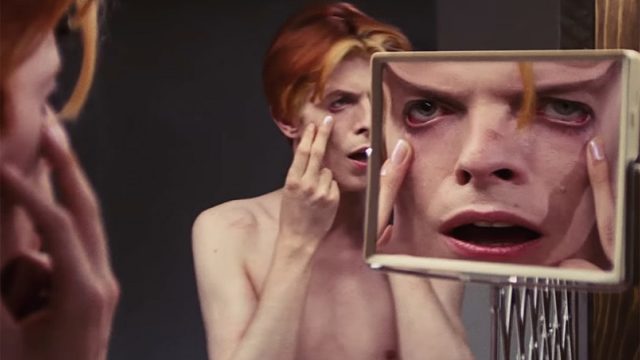The FAR would like to workshop that manuscript you’ve been working on. We’re very good at feedback. After all, we’re proposing rewrites on stories about the gig economy, celebrity acting skills, modernized crime novel adaptations, a publicly feminist show creator, and a singer/songwriter’s pious persona. Suggestion 1: all should feature talking dog sidekicks.
Thanks to Julius Kassendorf, scb0212 and Miller for contributing this week, the stories of their greatness remain unchanged. Send articles throughout the next week to ploughmanplods [at] gmail, post articles from the past week below for discussion, and Have a Happy Friday!
Pitchfork‘s Judy Berman argues that the conventional wisdom that Nicholas Roeg simply filmed David Bowie acting as himself for The Man Who Fell to Earth shortchanges Bowie’s transformative acting skills:
Doing justice to a character’s soul-deep transformation requires nuance—which is to say it requires understanding, alertness, and yes, acting on the part of the performer. Much of the press surrounding The Man Who Fell to Earth, over the years, has described Bowie as an amateur or a non-actor—which ignores the fact that, before spending the better part of two years inhabiting a character of his own creation, he’d trained in mime with underground legend Lindsay Kemp. With that in mind, it’s not so surprising that in early scenes he manages to convey both the authority of a superior life form and his character’s discomfort in such a flimsy excuse for his own skin, purely through his tense movements and gentle, purposeful tone of voice. Though his subtle tics can be easy to miss, I’ve never seen a human being put on eyeglasses the way he does—securing them on his ears first, then the bridge of his nose—at his first meeting with the lawyer. By the end of the film, however, Newton’s stiffness has wholly abated; drunkenly chasing Mary-Lou around his bedroom with a revolver in his hand, he’s all sloppy, spontaneous emotion. It takes a certain amount of control to move between what are more or less opposite states of being.
At Vulture, Wilfred Chan takes umbrage with Nomadland‘s departure from the book it’s based on and its depiction of gig labor:
There’s nothing wrong with portraying disenfranchised folks as bold, resilient, people — most are — so long as we fully account for the structures aligned against them. It’s why it’s not enough to call essential workers “heroes”: we need to get them hazard pay, time off, and PPE. But this is where Nomadland stumbles, apparently deciding it wasn’t possible to both portray Fern as dignified and depict the grim truth of migrant labor. The rough edges have been sanded off: We see Fern saunter down the Amazon warehouse floor with a bin, shooting a grin at Linda May, who’s scanning packages nearby. We see her on lunch break with a table of smiling coworkers; their cheerful supervisor shows off song lyrics tattooed on their arm. After work, Fern runs into an old friend, who asks, how’s working at Amazon? “Great money,” Fern replies. And that’s the extent of the film’s insight about the e-commerce giant, which ends up disappearing blandly into Nomadland’s terrain.
Jezebel‘s Kelly Faircloth wades through the detritus of Joss Whedon’s reputation as a feminist and looks for cultural contributions of Buffy the Vampire Slayer to save:
Besides, Whedon didn’t make Buffy all by himself—many, many women contributed, from the actresses to the writers to the stunt workers, and his reputation grew so large it eclipsed their part in the show’s creation. Even as he preached feminism, Whedon benefitted from one of the oldest, most sexist stereotypes: the man who’s a benevolent, creative genius. And Buffy, too, overshadowed all the other contributors who redefined who could be a hero on television and in speculative fiction, from individual actors like Gillian Anderson to the determined, creative women who wrote science fiction and fantasy over the last several decades to—perhaps most of all—the fans who craved different, better stories. Buffy helped change what you could put on TV, but it didn’t create the desire to see a character like her. It was that desire, as much as Whedon himself, that gave Buffy the Vampire Slayer her power.
Noel Murray advocates for The Burnt Orange Heresy‘s screenplay at the AV Club, in terms that could be speaking directly to The Solute:
This movie, like the novel it’s adapting, is in the tradition of writers like Elmore Leonard, Donald Westlake, Evan Hunter, Jim Thompson, Joe R. Lansdale, and David Mamet, who have cared primarily that their stories and characters be interesting, not that they leave their audience feeling uplifted or enlightened. These writers were bound to follow a plot where it led, even if—or sometimes especially if—it went somewhere twisted. That may not be the stuff that wins awards. But it’s entertaining and it’s honest. It’s great writing.
And in an interview with Steve Hyden, musician Julien Baker talks about the persona she grew into and why she needed to reject it:
‘I put my duty as an artist being a good person in the world ahead of the art itself, like ends over means. But I didn’t realize that I was making something that was, I don’t know, corny. Maybe “corny” isn’t the right word, but well-meaning, yet obviously withholding something. I’ve messed up so hard that I think it was good, on this record, to just let go of the prospect of ever being able to be a fully good person. It produced a lot different lyrical content, because I wasn’t listening back to the songs with a lens of myself as a puppet representing an ideal. I was just like, “These are reports from my life.”’

